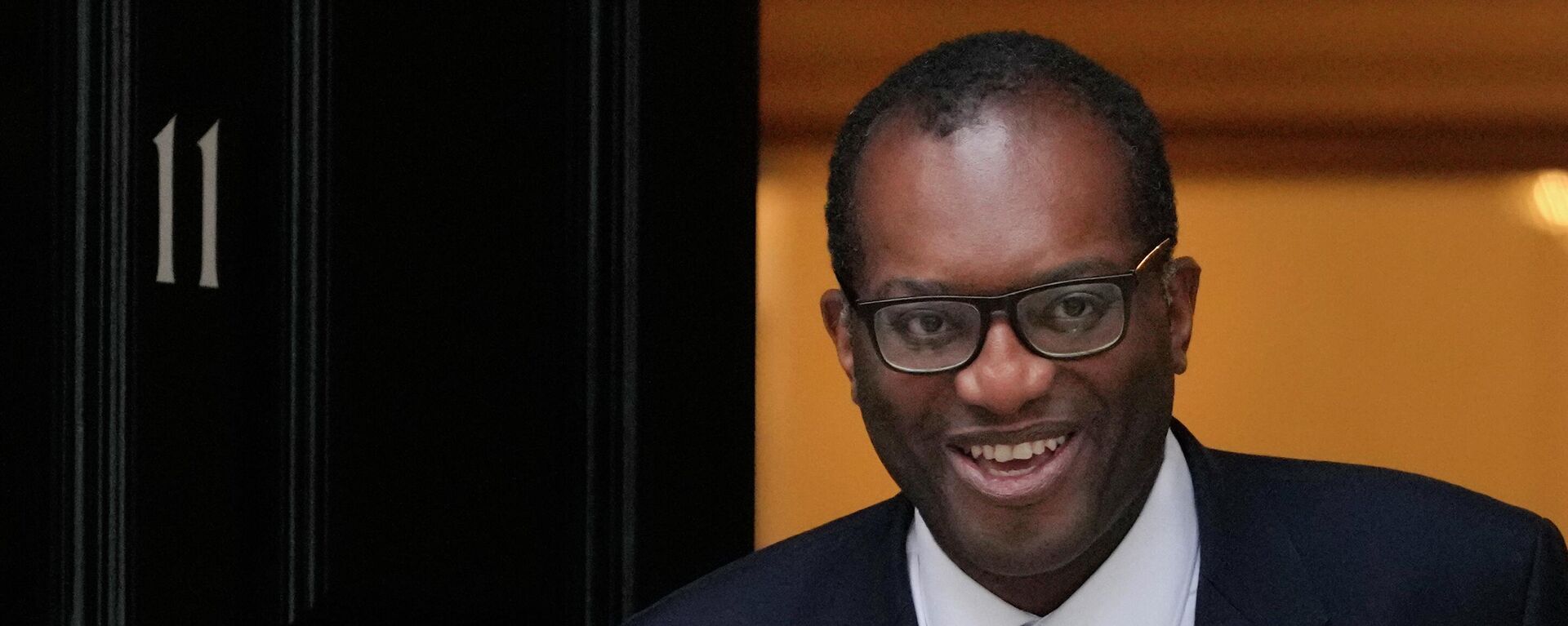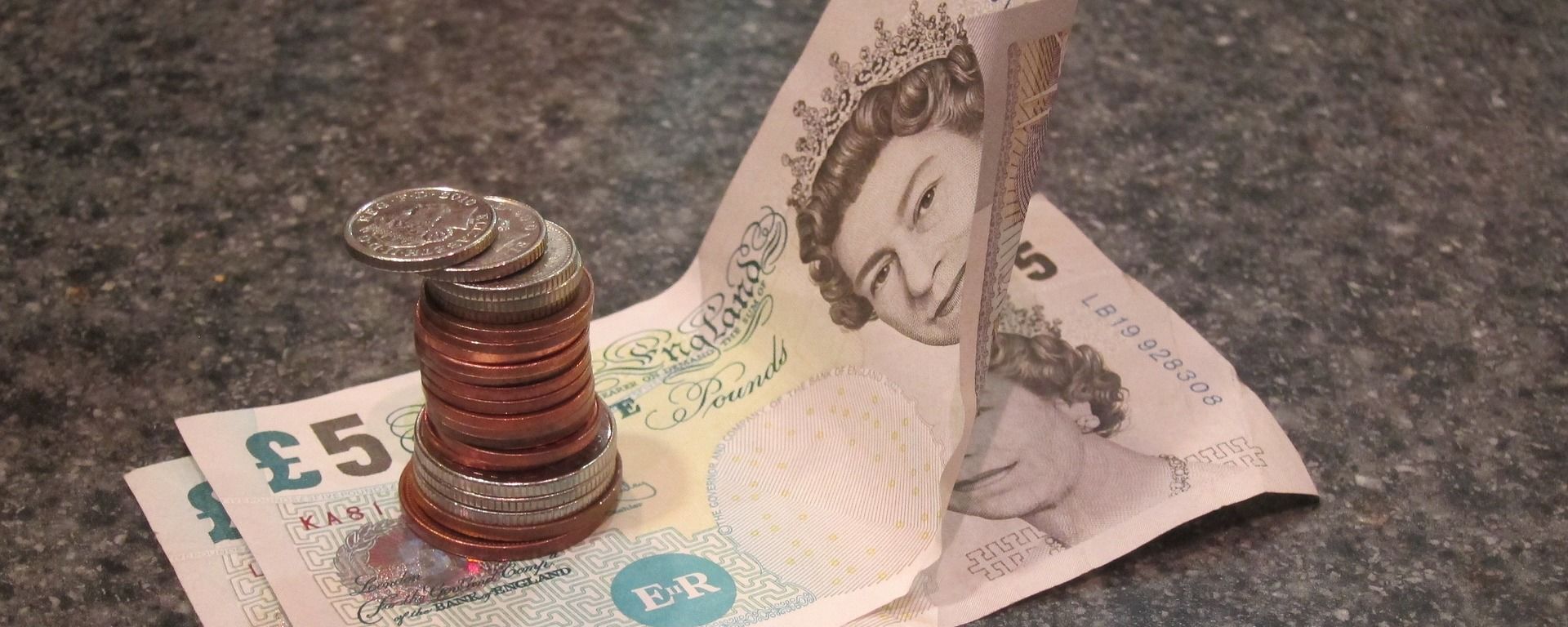https://sputnikglobe.com/20220929/conservative-mps-press-truss-to-fire-kwarteng-or-face-rebellion-amid-uk-financial-market-turmoil-1101328129.html
Conservative MPs Press Truss to Fire Kwarteng or Face Rebellion Amid UK Financial Market Turmoil
Conservative MPs Press Truss to Fire Kwarteng or Face Rebellion Amid UK Financial Market Turmoil
Sputnik International
Earlier this week, Downing Street denied reports that Prime Minister Liz Truss and Kwasi Kwarteng had a row during their recent meeting over how to respond to... 29.09.2022, Sputnik International
2022-09-29T05:57+0000
2022-09-29T05:57+0000
2023-05-28T15:21+0000
world
liz truss
kwasi kwarteng
government
tory mps
budget
crisis
united kingdom (uk)
https://cdn1.img.sputnikglobe.com/img/107929/89/1079298916_0:220:2857:1827_1920x0_80_0_0_7a8ef27796d240ac8b1524cced0e31ba.jpg
Angry Tory MPs have pressured Prime Minister Liz Truss to sack Chancellor Kwasi Kwarteng or face a mutiny amid a UK financial market turmoil and the Conservative backbenchers’ unease over the government’s emergency tax-cutting mini-budget.Conservative MP Robert Largan was cited by The Guardian as saying that he has “serious reservations about a number of announcements made by the chancellor” and that he does not believe that “cutting the 45p top tax rate is the right decision when the government’s fiscal room for maneuver is so limited.”Mel Stride, the Tory chair of the Treasury Select Committee, urged the party to try to avoid a political crisis on top of an economic one, saying, “The question is whether the [mini-budget] plan is going to succeed. It’s had an adverse reaction from the markets.”The Guardian reported that in private remarks, some MPs went even further, slamming the mini-budget as a disaster and insisting that only a reversal of this financial package and the sacking of Kwarteng “could get the party back on an even keel.”One MP told the newspaper that “Kwasi will have to go. She [Prime Minister Truss] won’t have any option. They are actually crashing the economy and she will need somebody to blame.”Referring to the party’s annual conference in Birmingham, scheduled for Saturday, one Tory lawmaker told The Guardian that the mood within the party was one of disbelief. “I don’t think it is sustainable. I predict the chancellor will get the sack and it will unravel from there,” the MP argued.One MP called on Truss to ditch her Chancellor and bring back a more experienced figure to oversee the Treasury, saying, “The only change possible that might prove reassuring is to change course and bring more of the old back. No Kwasi, no Chris Philp, install someone calm and confident.”Bank of England Launches Emergency Intervention The remarks came as Truss was accused of hiding away after the unveiling of the mini-budget caused economic turmoil and the collapse of the pound, with the Bank of England (BoE) forced to intervene on Wednesday to prevent a crisis in Britain’s major pension funds.The BoE embarked on an estimated £65 billion ($70 billion) buy-up of bonds amid what a Treasury source described to The Independent as “serious concerns about the short-term financial stability of some of the major pension funds in the UK.”While Junior Treasury Minister Andrew Griffith was then sent out to insist that the government would press ahead with the mini-budget, Truss was a no show, last seen in public sitting on the green Commons benches alongside Kwarteng for his statement last Friday.Downing Street insisted that it was “nonsense” that the pair had been at odds during the gathering, arguing that Truss meets Kwarteng every day and there was no argument between them.Earlier on Monday, the UK pound plummeted to its lowest level against the US dollar since the British currency went decimal in 1971. In early Asia-Pacific trading that day, the sterling fell by more than 4% to $1.0327 before it regained some ground to about $1.05, extending last week’s 3.61% drop.UK Chancellor's Mini-Budget The developments followed Kwarteng unveiling his mini-budget aimed at resolving the UK’s cost of living crisis and boosting the economic growth. The Chancellor, in particular, vowed to raise gross domestic product (GDP) growth to 2.5% and proposed more than £411 billion ($446 billion) in extra borrowing over five years.The financial package of measures also stipulate spending £60 billion ($65 billion) in the six months following October 2022 to reduce energy bills for UK households and businesses. Under the mini-budget, the basic income tax rate will be slashed to 19% from 20%, while a planned corporate tax hike to 25% will be reversed, with businesses continuing to pay a rate of 19%.The 45% income tax rate paid by those earning over £150,000 ($158,000) per year will be reduced to 40%, while the cap on bankers’ bonuses will be abolished, and alcohol duties will be frozen. Kwarteng also announced a series of supply-side measures, and a reform of planning rules with the creation of low-tax investment zones on top of this.
https://sputnikglobe.com/20220923/british-chancellor-unveils-mini-budget-to-tackle-runaway-inflation-1101117219.html
https://sputnikglobe.com/20220926/why-british-pound-will-remain-weak-over-short-term--even-weaker-in-long-run-1101247304.html
united kingdom (uk)
Sputnik International
feedback@sputniknews.com
+74956456601
MIA „Rosiya Segodnya“
2022
Oleg Burunov
https://cdn1.img.sputnikglobe.com/img/07e4/09/0b/1080424846_0:0:2048:2048_100x100_80_0_0_3d7b461f8a98586fa3fe739930816aea.jpg
Oleg Burunov
https://cdn1.img.sputnikglobe.com/img/07e4/09/0b/1080424846_0:0:2048:2048_100x100_80_0_0_3d7b461f8a98586fa3fe739930816aea.jpg
News
en_EN
Sputnik International
feedback@sputniknews.com
+74956456601
MIA „Rosiya Segodnya“
Sputnik International
feedback@sputniknews.com
+74956456601
MIA „Rosiya Segodnya“
Oleg Burunov
https://cdn1.img.sputnikglobe.com/img/07e4/09/0b/1080424846_0:0:2048:2048_100x100_80_0_0_3d7b461f8a98586fa3fe739930816aea.jpg
liz truss, kwasi kwarteng, government, tory mps, budget, crisis, united kingdom (uk)
liz truss, kwasi kwarteng, government, tory mps, budget, crisis, united kingdom (uk)
Conservative MPs Press Truss to Fire Kwarteng or Face Rebellion Amid UK Financial Market Turmoil
05:57 GMT 29.09.2022 (Updated: 15:21 GMT 28.05.2023) Earlier this week, Downing Street denied reports that Prime Minister Liz Truss and Kwasi Kwarteng had a row during their recent meeting over how to respond to the unprecedented fall in the UK pound, caused by the new UK Chancellor unveiling the country’s mini-budget to tackle the cost of living crisis.
Angry Tory MPs have pressured
Prime Minister Liz Truss to sack Chancellor Kwasi Kwarteng or face a mutiny amid a UK financial market turmoil and the Conservative backbenchers’ unease over the government’s emergency tax-cutting mini-budget.
Dwelling on the £45 billion ($48 billion) of unfunded tax cuts in Kwarteng’s mini-budget unveiled last Friday, former Cabinet Minister Julian Smith tweeted that “It is critical that the government is honest about the current situation and plays its part in stabilizing markets.” He claimed that No 10 “can keep a growth plan but needs to make changes, adding, “Not doing so will only continue further stress and strain on UK citizens.”
Conservative MP Robert Largan was cited by The Guardian as saying that he has “serious reservations about a number of announcements made by the chancellor” and that he does not believe that “cutting the 45p top tax rate is the right decision when the government’s fiscal room for maneuver is so limited.”

23 September 2022, 10:37 GMT
Mel Stride, the Tory chair of the Treasury Select Committee, urged the party to try to avoid a political crisis on top of an economic one, saying, “The question is whether the [mini-budget] plan is going to succeed. It’s had an adverse reaction from the markets.”
The Guardian reported that in private remarks, some MPs went even further, slamming the mini-budget as a disaster and insisting that only a reversal of this financial package and the sacking of Kwarteng “could get the party back on an even keel.”
One MP told the newspaper that “Kwasi will have to go. She [Prime Minister Truss] won’t have any option. They are actually crashing the economy and she will need somebody to blame.”
Another warned that “the markets have completely lost confidence in the British government” and that “If you reverse everything, the government falls, so they’re not going to do that.” According to the MP, Truss “could sack Kwasi and appoint somebody who could then make a few tweaks” even though “people are seriously underpricing the chance that it’s all over, that this government is dead on arrival.”
Referring to the party’s annual conference in Birmingham, scheduled for Saturday, one Tory lawmaker told The Guardian that the mood within the party was one of disbelief. “I don’t think it is sustainable. I predict the chancellor will get the sack and it will unravel from there,” the MP argued.
One MP called on Truss to ditch her Chancellor and bring back a more experienced figure to oversee the Treasury, saying, “The only change possible that might prove reassuring is to change course and bring more of the old back. No Kwasi, no Chris Philp, install someone calm and confident.”
Bank of England Launches Emergency Intervention
The remarks came as Truss was accused of hiding away after the unveiling of the mini-budget caused
economic turmoil and the collapse of the pound, with the Bank of England (BoE) forced to intervene on Wednesday to prevent a crisis in Britain’s major pension funds.
The BoE embarked on an estimated £65 billion ($70 billion) buy-up of bonds amid what a Treasury source described to The Independent as “serious concerns about the short-term financial stability of some of the major pension funds in the UK.”
While Junior Treasury Minister Andrew Griffith was then sent out to insist that the government would press ahead with the mini-budget, Truss was a no show, last seen in public sitting on the green Commons benches alongside Kwarteng for his statement last Friday.
In a separate development, The Guardian cited unnamed Whitehall sources as saying that Truss and Kwarteng had a row over how to respond to the UK pound plunging to an all-time low earlier this week. According to the insiders, there was “an argument” between the two during the Monday gathering, with the PM reportedly resisting the Chancellor’s suggestion that a Treasury statement was needed to calm down the markets.
Downing Street insisted that it was “nonsense” that the pair had been at odds during the gathering, arguing that Truss meets Kwarteng every day and there was no argument between them.
Earlier on Monday, the UK pound plummeted to its lowest level against the US dollar since the British currency went decimal in 1971. In early Asia-Pacific trading that day, the sterling fell by more than 4% to $1.0327 before it regained some ground to about $1.05, extending last week’s 3.61% drop.
UK Chancellor's Mini-Budget
The developments followed Kwarteng unveiling his mini-budget aimed at resolving the UK’s cost of living crisis and boosting the economic growth. The Chancellor, in particular, vowed to raise gross domestic product (GDP) growth to 2.5% and proposed more than £411 billion ($446 billion) in extra borrowing over five years.

26 September 2022, 18:03 GMT
The financial package of measures also stipulate spending £60 billion ($65 billion) in the six months following October 2022 to reduce energy bills for UK households and businesses. Under the mini-budget, the basic income tax rate will be slashed to 19% from 20%, while a planned corporate tax hike to 25% will be reversed, with businesses continuing to pay a rate of 19%.
The 45% income tax rate paid by those earning over £150,000 ($158,000) per year will be reduced to 40%, while the cap on bankers’ bonuses will be abolished, and alcohol duties will be frozen. Kwarteng also announced a series of supply-side measures, and a reform of planning rules with the creation of low-tax investment zones on top of this.







